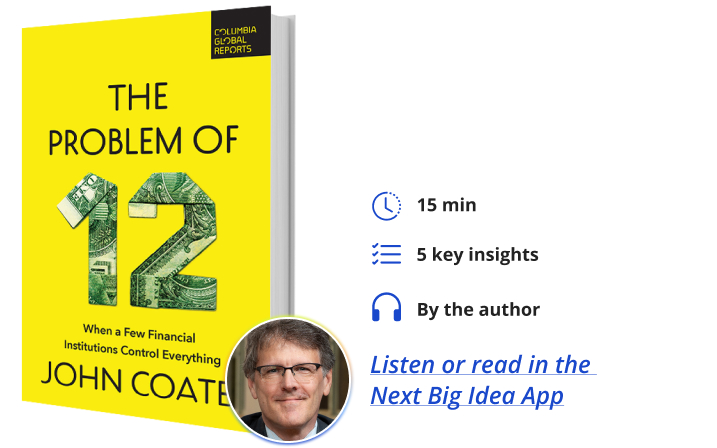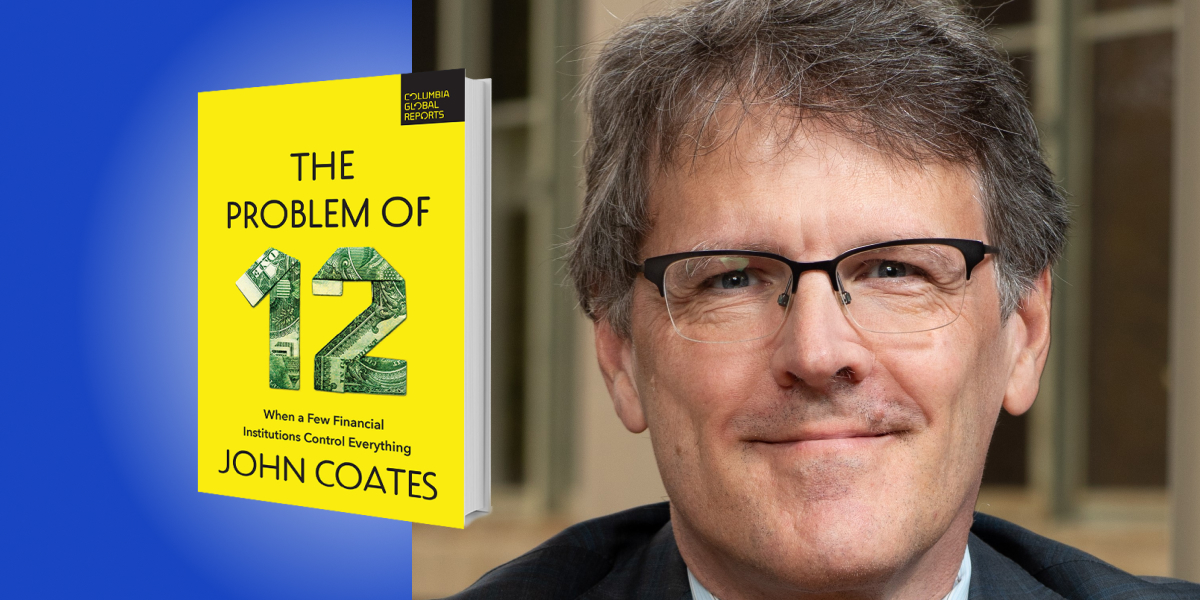John Coates is the John F. Cogan, Jr. Professor of Law and Economics at Harvard Law School, where he also serves as Deputy Dean and Research Director of the Center on the Legal Profession. He has served as General Counsel and Acting Director of the Division of Corporation Finance of the Securities and Exchange Commission; before joining Harvard, he was a partner at Wachtell, Lipton, Rosen & Katz, specializing in financial institutions and M&A. He has testified before Congress and provided consulting services to the Department of Justice, the Department of Treasury, and the New York Stock Exchange.
Below, John shares five key insights from his new book, The Problem of Twelve: When a Few Financial Institutions Control Everything. Listen to the audio version—read by John himself—in the Next Big Idea App.

1. Corporate governance is dramatically changing.
The U.S. economy used to be dominated by hundreds of large company managers: Exxon, Disney, Dell, et cetera. Since roughly 2000, however, those companies have increasingly come under the influence of two types of financial firms: index funds and private equity funds.
The roughly dozen or so people who oversee those funds already have had major effects on companies like Exxon and Dell Computer. In 2018, for example, BlackRock and Vanguard—the two biggest index funds—installed three board members at Exxon with the goal of bending Exxon’s strategy toward a low-carbon future.
Over the years, hundreds of major companies have been bought entirely out by private equity firms—Staples, Toys R Us, Neiman Marcus, Michaels, Petco, and Dell—taking those companies out of any public disclosure system. And the assets those funds control continue to grow at a far faster pace than the economy.
2. Index funds are too good for their own good.
Index funds, in particular, are in a way a victim of their own success. They never set out to control the overall economy. They were designed to deliver on a basic set of middle-class investment goals. They are means for ordinary Americans to invest for the long-term, achieving diversification at a low cost. They are simple to monitor and do better on average than any other means to invest that anyone outside the top 0.1 percent can reliably achieve on their own.
The result is that they have continued to grow and grow and grow. Currently, just the top four index fund families own more than 25 percent of nearly all large U.S. companies listed on a stock exchange. They have acquired massive power over corporate America without intending to. With that power comes responsibility, and the need for accountability.
“Currently, just the top four index fund families own more than 25 percent of nearly all large U.S. companies listed on a stock exchange.”
This is what refers to as a problem of 12. It is a problem when 12 or so individuals have so much influence over our entire economy. Only reinforcing the problem is that most American don’t know these people exist, and very few people, even specialists, can name them, much less hold them accountable for how they are using their power.
3. Economies of scale in finance create a political problem.
The reason index and private equity funds have acquired so much power is that they benefit from economies of scale. Economies of scale exist when it’s cheaper to do something in bulk. Think about buying huge amounts of paper towels at Costco. The price per roll is cheaper than if you buy a single roll at CVS. Doing things in bulk is, by and large, a good thing for consumers and the economy as a whole.
Economies of scale are strong in finance. Finance is about gathering and investing money—mostly on a computer. Those tasks are mostly no harder, and often easier, at scale. Banks pay more interest if you give them more money to hold.
Index and private equity funds are built on economies of scale. The largest have grown the most and continue to grow faster as they grow larger. BlackRock and Vanguard can charge the lowest fees because they are the largest mutual funds. Blackstone and KKR are now much larger than most rival private equity firms.
Here’s the key point: economies of scale—which are good in themselves—by definition concentrate assets. They create a problem of 12. They are at odds with the dispersed power that American democracy has always sought to preserve.
4. Private equity funds are not really private, and they deserve more scrutiny.
While index funds already are required to disclose a lot to the public, private equity funds do not. They are designed to avoid the legal triggers for public disclosure. They are treated as “private” in U.S. securities law. None raise money directly from the public. Instead, they invest money for other institutions.
But those other institutions actually derive their money from the public. Most private equity money comes from pension funds, sovereign wealth funds, endowments, and insurance companies. This money has been invested on behalf of millions of individuals, few of whom even know their money is being used this way.
“Their fees cut into the savings of millions of workers and retirees.”
The “private” in “private equity” is a brilliant bit of marketing. It’s a label that suggests they can or should be ignored by regulators and the American public. But in fact, such funds deserve much more scrutiny. If they make mistakes, their investment failures cause investment losses and layoffs. Their fees cut into the savings of millions of workers and retirees. They are growing ever larger over time, taking over more and more of the American economy. With each buyout, they shrink the information the public has about how their economy works.
5. Wall Street affects Main Street—money and power go hand in hand.
Finance and financial institutions are complex. Index funds grow because they simplify investing. But the problem of 12 means everyone is affected politically by these financial institutions. As with banks and insurance companies, which by law are barred from having control over other companies, financial economies of scale make it politically dangerous to ignore these funds.
People of course disagree about politics—ever more so today. Despite clear and convincing evidence that climate change is real, man-made, and capable of being mitigated, many Americans disagree. Yet the power their money conveys is wielded by a few people whose views on climate change vary, yet were not chosen for those views.
Republicans attack BlackRock as too “green.” Yet Blackstone, the private equity firm, also touts itself as pursuing low-carbon outcomes. Vanguard and Apollo may well be too “brown” for many—if they knew enough about how those funds operate. The same is true for diversity, labor and trade policy, even conflicts in the Middle East.
The problem of 12 that index and private equity funds create means is a problem for everyone. For American democracy to work, we all have to pay attention to what these funds are doing with our money, and potentially change the way they are regulated.
To listen to the audio version read by author John Coates, download the Next Big Idea App today:
































